We earn a commission from partner links on this site. This doesn’t affect our opinions or evaluations.
Group-based education fosters heightened student participation and boosts program completion statistics. This trend has inspired numerous educators to develop and market synchronized online learning experiences.
These collaborative course formats present unique technical challenges, requiring specialized platforms that support their distinct operational requirements.
Throughout this guide, we’ll explore the ten finest group learning platforms available in 2025 and provide expert advice on selecting the perfect solution for your educational objectives.
Now, let’s begin our exploration.
When selecting a platform for your synchronized learning program, it’s crucial to understand that you’ll need particular capabilities not necessarily found on standard educational delivery systems.
In contrast to self-directed programs, group-based courses operate with multiple learners progressing simultaneously. These instructor-guided experiences emphasize peer collaboration as a fundamental component.
While your platform still requires foundational educational development resources—such as curriculum structuring tools, multimedia content support, engaging playback interfaces, scheduled content release functionality, and additional essentials—here are specific features to prioritize when evaluating platforms for synchronized learning programs:
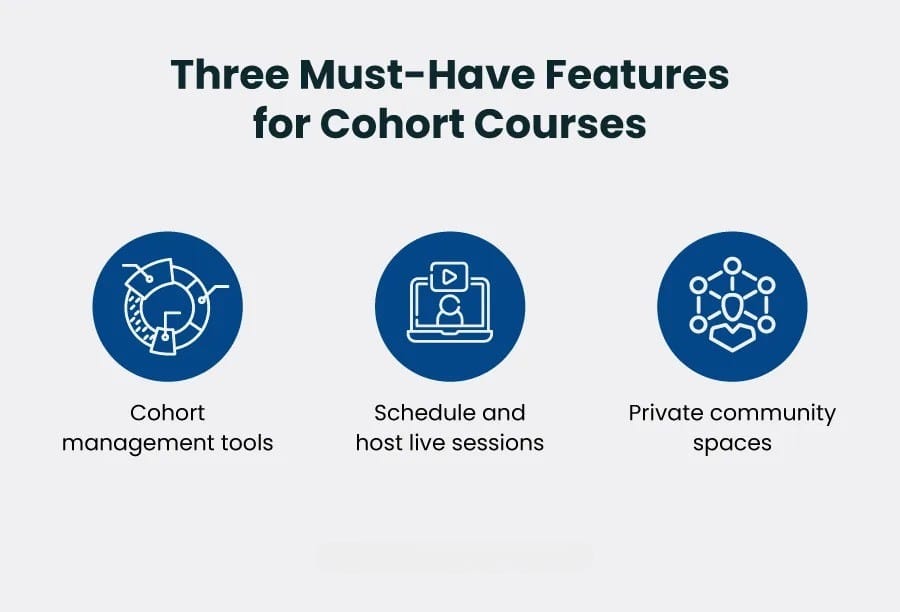
While these represent the fundamental requirements to consider, your specific educational approach might benefit from additional capabilities such as collaborative assignments, participant evaluation systems, and real-time discussion channels.
Let’s now examine the premier platforms available for developing synchronized learning experiences.
Thinkific has maintained its position as a frontrunner in the cloud-based educational delivery space for numerous seasons, earning recognition for its exceptional curriculum development and student interaction capabilities.
This comprehensive platform delivers all essential functionalities educators expect from a premium course delivery system. It boasts an intuitive interface, adaptable lesson construction tools, assessment and certification options, scheduled content release features, mobile accessibility through dedicated applications, and fundamental marketing and monetization instruments.

For developing synchronized learning experiences, Thinkific provides these powerful capabilities:
Complementing these core features, Thinkific maintains a comprehensive marketplace offering numerous complementary integrations. Consequently, if certain functionality (such as achievement-based learning) isn’t available through native features, you’ll likely discover an appropriate extension.
Regarding Thinkific subscription options, the platform presents five distinct packages, including a no-cost entry tier. However, accessing the group learning capabilities requires upgrading to the Start package, priced at $99/month.
In summary, Thinkific demonstrates exceptional versatility across various implementation scenarios. Whether delivering self-directed or synchronized learning programs, this comprehensive platform provides all essential tools, earning its position as our primary recommendation.
Kajabi functions as a comprehensive solution that empowers you to manage every aspect of your educational enterprise. This integrated approach provides tools not only for curriculum development but also for creating professional web presences, content publishing platforms, customer journey pathways, and subscriber communication campaigns.
Furthermore, Kajabi offers a versatile curriculum development system supporting advanced features including knowledge assessments, participant submissions, achievement recognition, scheduled content delivery, prerequisite management, and additional capabilities. Moreover, the platform includes integrated artificial intelligence tools that significantly reduce your workload by streamlining various aspects of program development.

When it comes to synchronized educational delivery, Kajabi satisfies all fundamental requirements:
Additionally, Kajabi provides complimentary custom-branded mobile applications, allowing your participants to engage with your educational content regardless of location.
Regarding subscription costs, Kajabi packages begin at $149/month and include all essential functionalities required for synchronized learning programs.
Therefore, if you require a platform that handles both program delivery and comprehensive business operations management, Kajabi represents an excellent investment for your educational enterprise.
Circle functions primarily as a sophisticated digital engagement platform, yet it effectively serves educational delivery purposes as well.
Circle incorporates educational program development capabilities, including intuitive curriculum organization tools, native content storage solutions, and scheduled release functionality, despite lacking assessment creation and achievement certification options.
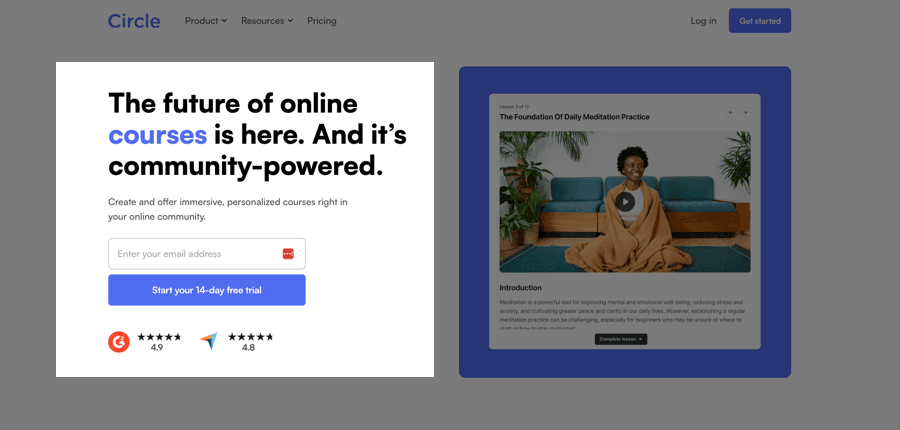
Circle stands out as a powerhouse for cultivating vibrant online learning communities with remarkable features:
Notably, the platform offers comprehensive mobile applications, available in both free and customized branded versions, ensuring students can access course content and community resources from anywhere.
Regarding Circle pricing, the entry-level tier starts at $49 monthly. However, course creation capabilities require upgrading to the Professional plan at $99 per month.
Circle defies conventional online course platform models, emerging as an exceptional choice for entrepreneurs seeking to construct robust online communities and deliver cohort-based learning experiences in 2025.
LearnDash emerges as a renowned WordPress Learning Management System (LMS) plugin that expertly supports cohort-based course delivery. Although WordPress demands a higher level of technical proficiency, it simultaneously offers unparalleled customization compared to traditional hosted platforms.
LearnDash empowers course creators with comprehensive tools to design intricate course curricula, implement dynamic quizzes and assignments, generate professional completion certificates, strategically schedule content releases, and unlock a multitude of advanced educational features. The platform distinguishes itself through sophisticated engagement mechanisms, including intelligent engagement triggers and an innovative gamification system that motivates and incentivizes student participation.

LearnDash’s homepage
LearnDash offers robust group management capabilities, allowing you to strategically organize users into sophisticated groups and subgroups. The platform provides comprehensive reporting tools that deliver in-depth insights into student enrollment, individual progress tracking, and overall performance metrics.
For seamless live class experiences, LearnDash integrates directly with Zoom, while simultaneously enabling community building through Buddyboss to create a dedicated student networking environment.
Regarding pricing, a single-site license is priced at $199/year. It’s crucial to understand that this represents only the plugin cost, and the total investment for establishing a comprehensive course website will be substantially higher.
Despite the additional setup complexity, LearnDash remains an exceptional solution for entrepreneurs aiming to deliver cohort-based courses through a WordPress-powered platform in 2025.
Kajabi emerges as a comprehensive ecosystem designed to empower digital entrepreneurs, offering an integrated solution for online course creation and membership management. The platform provides sophisticated course development tools, a native community-building infrastructure, professional coaching product capabilities, and versatile mobile applications available in both free and branded versions.
Beyond course creation, Kajabi enables users to construct fully functional websites, maintain dynamic blogs, develop strategic marketing funnels, and execute comprehensive email marketing campaigns. Although the platform’s pricing reflects a premium positioning, it presents an unparalleled opportunity to centralize and streamline your entire knowledge business operations within a single, powerful digital environment in 2025.
Mighty Networks shares a strategic approach with Circle, positioning itself fundamentally as an online community platform that seamlessly integrates online course capabilities as a complementary feature.
The platform distinguishes itself through an intuitive drag-and-drop course builder, enabling creators to effortlessly construct comprehensive course structures encompassing diverse content types including video lessons, text-based modules, and interactive quiz experiences.
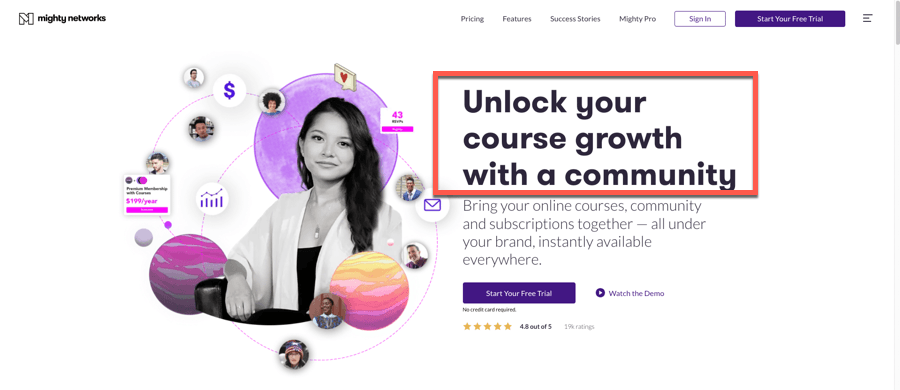
Mighty Networks’ course landing page
Each course within the platform receives a dedicated discussion feed, with robust capabilities to activate advanced engagement tools like live event hosting, group chat functionality, and comprehensive member directory features. These innovations position Mighty Networks as a compelling solution for delivering dynamic cohort-based course experiences.
Mirroring Circle’s approach, Mighty Networks provides both free and branded mobile application options, ensuring students can seamlessly engage with courses and community discussions from any location.
Mighty Networks’ pricing structure initiates at $39 monthly, though accessing the full suite of course-related features requires upgrading to the Business Plan at $119 per month.
In the evolving landscape of online learning platforms for 2025, Mighty Networks emerges as a robust option for creators seeking a community-centric approach to cohort-based courses, making it a noteworthy consideration for digital education entrepreneurs.
Disco emerges as a cutting-edge cohort-based learning platform meticulously designed to elevate live course experiences in 2025. Beyond traditional evergreen content, the platform enables seamless integration of live events delivered through Zoom, with intelligent automated reminder systems ensuring maximum participant engagement.
The platform’s innovative architecture allows course creators to strategically segment course cohorts into dynamic sub-groups, facilitating more personalized and interactive learning environments. This granular approach empowers instructors to create collaborative spaces where, for instance, student assignment submissions can be shared with peer groups, fostering a robust culture of collaborative learning and constructive feedback.
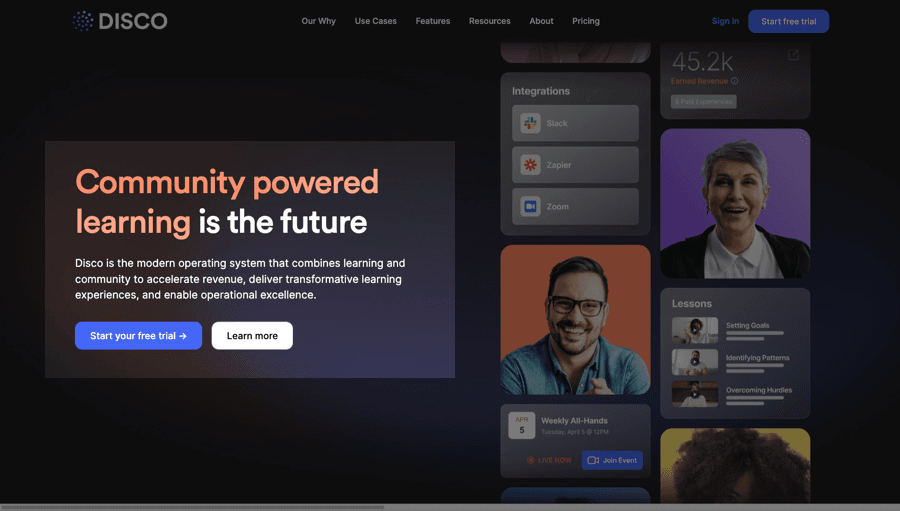
Disco’s homepage
The platform enables creators to establish a fully branded learning community, providing students with sophisticated communication channels including dedicated group spaces and direct messaging capabilities. This approach facilitates peer-to-peer learning and collaborative knowledge exchange.
However, Disco exhibits some limitations in its current offering, notably lacking critical course creation tools such as quiz functionality and certificate generation. These omissions may pose challenges for educators seeking comprehensive course development features.
Despite these constraints, Disco presents a compelling solution for entrepreneurs specifically focused on delivering cohort-based courses without requiring extensive additional course format flexibility. For those committed to a singular, interactive learning approach, the platform offers a targeted solution.
Regarding pricing in 2025, Disco provides three strategic tier options: the Pro plan at $99 per month, the Organization plan at $449 per month, and the Max plan at $1,249 per month, catering to diverse scale requirements of online course creators.
exploring alternative course formats remains an option for those seeking more comprehensive educational delivery methods.
Teachfloor positions itself as a specialized platform dedicated to delivering cohort-based online courses, boasting an impressive array of features tailored to interactive and engaging learning experiences in 2025.
The platform revolutionizes course delivery by offering seamless Zoom integration for live sessions, complemented by an innovative native calendar scheduling system that simplifies session management. Educators can strategically design course experiences with robust assessment tools, including dynamic quiz creation and assignment management.
Courses can be structured with time-sensitive assignments, ensuring clear learning progression and accountability. The platform’s peer review mechanism introduces a collaborative dimension, empowering students to evaluate and provide constructive feedback on each other’s work, thereby deepening learning engagement and creating a more interactive educational environment.
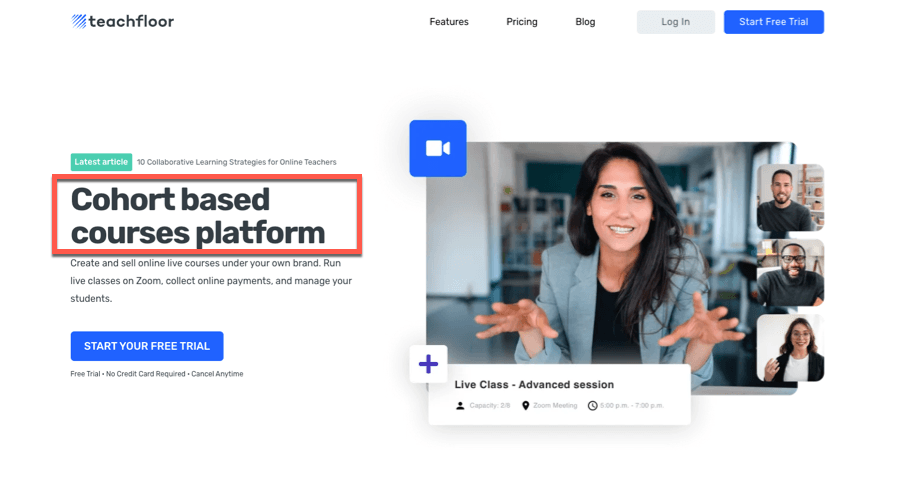
Teachfloor’s homepage
To enhance learner interactions, Teachfloor developed an innovative Community Wall feature that establishes a dedicated private space within each cohort course, enabling students to connect and collaborate effectively.
While Teachfloor offers an impressive solution for cohort-based courses with numerous noteworthy features, its pricing structure remains problematic. The starter package at $89/month disappointingly limits you to just 50 students without domain customization options. To utilize your own branded domain, you’ll need to invest in their premium tier at $349/month.
Maven functions as a dedicated cohort-learning environment featuring an extensive collection of educational programs from industry-leading educators across diverse fields including business, marketing, finance, technology, productivity, and numerous other specialties.
It’s important to understand that Maven differs from traditional course creation software – this platform doesn’t enable you to build your own educational ecosystem, nor does it provide ownership of the student base.
Rather, you must submit an application to join their instructor roster and publish your educational content within their ecosystem. You can then promote your offerings to your existing followers while simultaneously leveraging Maven’s established learner community.

Maven handles all the technical infrastructure required to deliver your cohort-based programs and foster student interaction. For each learning cohort, the platform establishes a dedicated community space where participants can view the curriculum structure and participate in meaningful conversations.
As the education provider, you can seamlessly organize live learning events that automatically display on the built-in course calendar, while utilizing the integrated Zoom functionality to deliver real-time instruction sessions.
In terms of financial structure, Maven operates without monthly subscription fees. Instead, they implement a straightforward revenue-sharing model, retaining 10% of your course sales as their commission.
Consequently, if your goal isn’t to establish a comprehensive educational brand but rather to distribute your cohort-based learning experiences through an established educational marketplace, Maven presents an excellent solution for your needs.
Xperiencify serves as a specialized educational platform crafted exclusively for interactive, game-based learning approaches, making it an exceptional choice for delivering engagement-driven cohort programs.
The platform boasts industry-leading gamification capabilities. Through its comprehensive system of point allocation, achievement badges, and milestone celebrations, you can develop an engaging and enjoyable educational journey for your participants.
Additionally, Xperiencify provides built-in community functionality, allowing you to establish distinct conversation spaces tailored to each individual cohort group.

Xperiencify’s homepage
Xperiencify’s subscription model begins at $49/month with a restriction of only 50 concurrent learners. Should you require additional student capacity, you’ll need to transition to their expanded $99/month subscription tier.
From an overall perspective, this platform delivers a worthwhile solution for facilitating engagement-driven cohort learning experiences, provided you can work within the constraints outlined above.
To conclude our comprehensive overview, we examine Eduflow, a specialized platform designed for delivering structured cohort learning experiences primarily tailored for corporate environments.
The platform features a robust course development system supporting diverse content formats including video materials, visual elements, written content, downloadable resources, and additional media types. You also have the capability to incorporate SCORM-compatible materials from professional authoring applications such as Adobe Captivate or Articulate Storyline.
For effective cohort organization, Eduflow provides a user tagging system that enables systematic categorization of participants into primary groups and secondary subsets.
While Eduflow doesn’t offer comprehensive community-building architecture, it does include practical contextual discussion functionality within lessons. For those requiring dedicated community spaces, the platform offers seamless integration with Circle’s community platform.
Regarding synchronous learning sessions, Eduflow connects smoothly with Zoom to facilitate interactive group conferences and instruction.
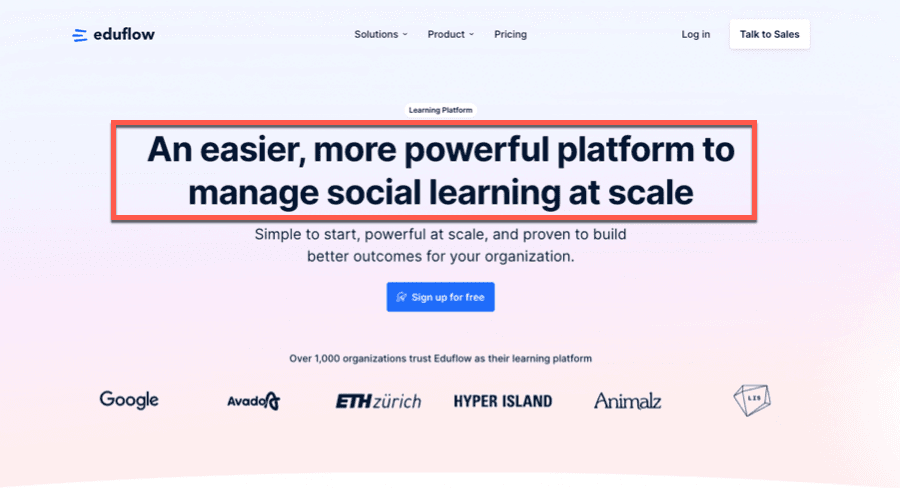
Eduflow’s homepage
Furthermore, Eduflow delivers several distinctive capabilities designed to enhance collaborative learning within your cohort programs:
Regarding financial investment, Eduflow offers a complimentary tier supporting up to 10 concurrent students. Their Lite subscription package costs $49/month (accommodating up to 50 learners), while their comprehensive Pro subscription requires $649/month (supporting up to 500 participants). For educational programs exceeding these enrollment thresholds, you’ll need to contact their sales department for customized pricing options.
Eduflow’s specialized approach makes it particularly well-suited for corporate entities seeking to develop their workforce through structured learning. If professional development constitutes your primary objective, this platform represents an ideal solution for your educational needs.
In this comprehensive analysis, we’ve examined the ten leading cohort-learning platforms and their distinctive offerings. We trust our evaluation has helped you identify the ideal solution for your cohort-based educational programs.
If you’re still deliberating on your final choice, here’s a concise summary of our premier recommendations:
Alternatively, if you prefer a comprehensive solution that handles multiple aspects of your operation, consider Kajabi. Beyond its robust educational and community functionalities, this platform enables website creation, blog management, sales funnel development, and sophisticated email marketing campaigns.
For educators prioritizing interactive learning environments, we suggest Circle, which provides industry-leading engagement tools specifically designed for fostering vibrant learning communities.
We sincerely hope this resource has provided valuable insights for your decision-making process. Do you have additional questions? Please share them in the comments section below, and we’ll promptly address your inquiries.
An online cohort course is a type of course where students learn together in a group, following the same schedule and syllabus. Unlike self-paced courses, cohort courses emphasize working together and learning as a team.
Cohort-based learning focuses on social learning and getting students involved. They study the course material together, sharing their experiences and discussing them during group sessions. This approach not only improves students’ results but also leads to higher course completion rates.
A cohort-based course platform should let you create and deliver courses focused on the needs of learners. This platform can either specialize in these courses or include them as one type of offering.
A good cohort course platform should have basic course creation tools but also include features for managing groups, supporting online discussions, and hosting live sessions. Tools for tracking progress and assessments are also useful.
can focus solely on the latter or include them as a course option.
A community builder is essential for a cohort-based learning platform, as it enhances collaboration and social interactions. The platform should allow the creation of different community spaces for various cohorts.

Daniel NicFounder, SellingOnliceCoursesGuide.comis an entrepreneur and digital education specialist who founded sellingonlinecoursesguide.com, a platform dedicated to helping creators and educators successfully navigate the online course marketplace. Through his website, he shares insights and strategies for developing, marketing, and monetizing online educational content. His work focuses on empowering course creators to build sustainable online businesses while effectively sharing their knowledge with students worldwide.

Daniel Nic is an entrepreneur and digital education specialist who founded sellingonlinecoursesguide.com, a platform dedicated to helping creators and educators successfully navigate the online course marketplace. Through his website, he shares insights and strategies for developing, marketing, and monetizing online educational content. His work focuses on empowering course creators to build sustainable online businesses while effectively sharing their knowledge with students worldwide.

We respect your privacy and will never spam you.